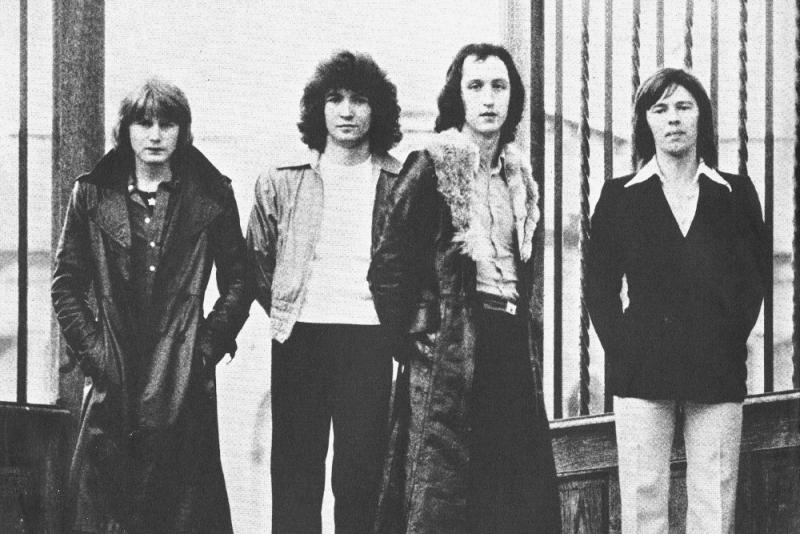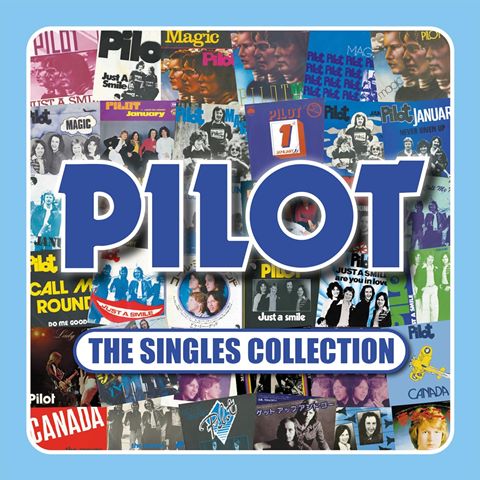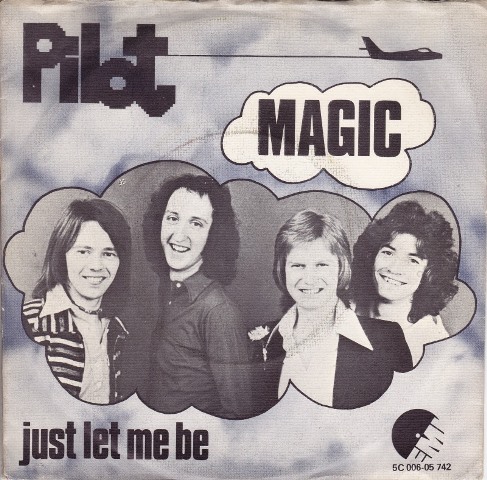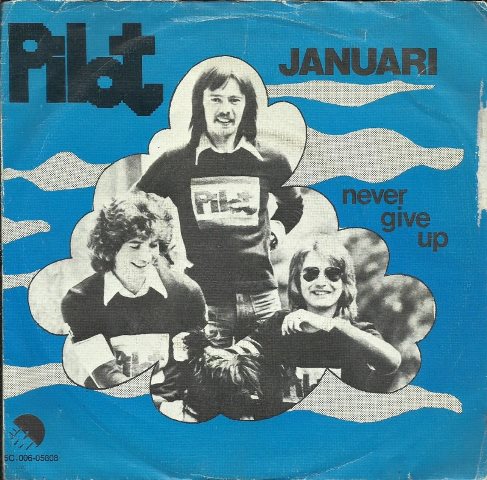Music Reissues Weekly: Pilot - The Singles Collection | reviews, news & interviews
Music Reissues Weekly: Pilot - The Singles Collection
Music Reissues Weekly: Pilot - The Singles Collection
How there’s more to the Seventies hitmakers than ‘Magic’ and ‘January’

"It was really strange. Really quite conflicting, the sort of thing most bands didn't have to deal with. At the front, we'd have the kids who'd come along to scream and at the back were the people who'd come along to hear the music. We didn't know whether to talk to the kids at the front or to speak over their heads to the other people.”
While speaking to Melody Maker in September 1976 after the release his band’s third album Morin Heights, Pilot’s guitarist Ian Bairnson recognised a difficulty: that their hit singles had attracted one audience, and that another audience was also interested in them. On one hand, charting with “Magic,” “January,” “Call me Round” and “Just a Smile” (in a re-recorded form to that initially issued in 1974) had established them – as a single’s band; a pop group – but they wanted to push off elsewhere. “Running Water,” their then-recent single, issued in April 1976, was akin to a Paul McCartney power ballad were it filtered through a 10cc lens.
 Of “Running Water,” that issue of Melody Maker said it was “about as opposite as any previous Pilot single as black is to white, [and] was the track chosen as the single to emphasise the band's ‘change of emphasis,’ but the change was too drastic and the song flopped.”
Of “Running Water,” that issue of Melody Maker said it was “about as opposite as any previous Pilot single as black is to white, [and] was the track chosen as the single to emphasise the band's ‘change of emphasis,’ but the change was too drastic and the song flopped.”
Pilot had a hard log to roll. Typecast by the early hit singles, the band limped on into 1977 when a last single was issued that November. Signed by EMI around the same time as Cockney Rebel and Queen, they found themselves on the Arista label in 1977 for three final singles. The Singles Collection tells the story from the seven-inch perspective over two CDs. All 13 Pilot singles are supplemented by one released under the name Scotch Mist (oddly, it appeared on EMI between the debut Pilot single and first hit “Magic” – did the label have confidence in the band?) and solo 45s by band members Billy Lyall and David Paton along with an album track which materialised on a Record Mirror flexi-disc.
The Pilot story is intriguing, and dominated by the timeless magnificence of the powerpop classics “Magic” and “January,” and that the former went US Top Five in October 1975. Amongst the curious aspects is that the American success of “Magic” was a one-off. No other Pilot singles hit the Top 30 there.
Founder members Billy Lyall (keyboards) and David Paton (guitar) had been in a late Sixties version of The Bay City Rollers. In 1973, they worked together on an album titled Bless This House which was credited to The Loreburn Singers. They both played on it. Paton, who had been in a band called Christyan, also sang. Lyall was the studio engineer (he already a raft of experience working with Scotland-recorded releases, including a 1972 Billy Connolly album). Subtitled Hymns And Sacred Songs For All The Family, the album was released by the EMI imprint One-Up. Pilot would be next for Lyall and Paton.
 With drummer Stuart Tosh on board, the trio signed with EMI in 1974. “Just a Smile,” the first single, came out in June that year. It’s fantastic: a little bit like Badfinger, with a solid Paul McCartney vibe. B-side “Don't Speak” wasn’t as strong and, despite its bubblegum feel, was analogous to what Todd Rundgren’s band The Nazz had been up to around 1969. Next, as Scotch Mist, the euro-stomper “Ra-Ta-Ta,” a pointless cover of a song that had been a hit in Germany in 1970. Not great. Then, with second guitarist Ian Bairnson on board, “Magic.” Wondrous pop. B-side “Just Let me be” confirms Pilot had a lot to offer.
With drummer Stuart Tosh on board, the trio signed with EMI in 1974. “Just a Smile,” the first single, came out in June that year. It’s fantastic: a little bit like Badfinger, with a solid Paul McCartney vibe. B-side “Don't Speak” wasn’t as strong and, despite its bubblegum feel, was analogous to what Todd Rundgren’s band The Nazz had been up to around 1969. Next, as Scotch Mist, the euro-stomper “Ra-Ta-Ta,” a pointless cover of a song that had been a hit in Germany in 1970. Not great. Then, with second guitarist Ian Bairnson on board, “Magic.” Wondrous pop. B-side “Just Let me be” confirms Pilot had a lot to offer.
After this “January,” released in January 1975, was the next hit. A little less melodic, the Rundgren-esque follow-up single “Call me Round” still sounded like a hit. It was, albeit charting lower than “Magic” and “January.” In September 1975 came a revamped version of debut 45 “Just a Smile.” Again, a minor hit and not a smash. November 1975’s “Lady Luck” was the next single. Despite the hopeful title, no chart action.
Up this this point, Pilot were produced by EMI staffer Alan Parsons. “Running Water,” the seven-inch after “Lady Luck” was produced by Roy Thomas Baker, who was also working with fellow EMI band Queen. As Melody Maker said, “Running Water” was a change in style and a miss. There were two more OK Baker-produced EMI singles and then, in 1977, the move to Arista, the oddly Queen-ish final single “Ten Feet Tall” and the split.
 If anyone had been looking in 1976, it would have been clear Pilot had an in-built shelf life. July 1976 single “Canada” was planned as a David Paton solo release, but issued as by Pilot. In September that year, Billy Lyall released a solo single. There was also a solo album.
If anyone had been looking in 1976, it would have been clear Pilot had an in-built shelf life. July 1976 single “Canada” was planned as a David Paton solo release, but issued as by Pilot. In September that year, Billy Lyall released a solo single. There was also a solo album.
Also in 1976, Paton played and sang on Alan Parsons’ Tales Of Mystery And Imagination - Edgar Allan Poe album (all four of Pilot were on Alan Parsons Project releases). Pilot was winding down. When that happened, for the still-active Paton there would be more work with Parsons, a contribution to Paul McCartney/Wings’ “Mull of Kintyre” and credits on the first two Kate Bush albums. He also worked in the studio with Chris de Burgh and Chris Rea. Guitarist Ian Bairnson, who died in 2023, trod a similar path and became a much-called upon session player: his credits also include Kate Bush – it is his guitar solo on “Wuthering Heights” – and Chris de Burgh, as well as Bucks Fizz, Elaine Paige and, on stage, Eric Clapton and Sting. Billy Lyall – who died in 1989 – returned to his pre-Pilot role as a studio engineer and producer, and was integral to records by Hi-Tension, Dollar, Sheena Easton and more. After Pilot, drummer Stuart Tosh also had a well-honed path through the music business with, amongst others, Roger Daltrey and 10cc, who he joined. At various times, members of Pilot recorded with each other.
“Magic” and “January” will forever, inescapably, define Pilot. But a little digging reveals that this was a self-starting band sporting members who knew what they doing and how to achieve their goals in the studio. They were not the creation of and beholden to a manager. When the hits stopped coming, each of the four members of Pilot settled into roles which exploited their individual talents. “Magic” and “January,” as wonderful as they are, do not tell the full story.
- Next week: The Sonics - High Time. The heavy sound of the Pacific Northwest in the Sixties is celebrated over seven seven-inch singles in a box
- More reissue reviews on theartsdesk
- Kieron Tyler’s website
Explore topics
Share this article
The future of Arts Journalism
You can stop theartsdesk.com closing!
We urgently need financing to survive. Our fundraising drive has thus far raised £49,000 but we need to reach £100,000 or we will be forced to close. Please contribute here: https://gofund.me/c3f6033d
And if you can forward this information to anyone who might assist, we’d be grateful.

Subscribe to theartsdesk.com
Thank you for continuing to read our work on theartsdesk.com. For unlimited access to every article in its entirety, including our archive of more than 15,000 pieces, we're asking for £5 per month or £40 per year. We feel it's a very good deal, and hope you do too.
To take a subscription now simply click here.
And if you're looking for that extra gift for a friend or family member, why not treat them to a theartsdesk.com gift subscription?
more New music
 Album: The Black Keys - No Rain, No Flowers
Ohio rockers' 13th album improves on recent material, but still below mainstream peak
Album: The Black Keys - No Rain, No Flowers
Ohio rockers' 13th album improves on recent material, but still below mainstream peak
 Wilderness Festival 2025 review - seriously delirious escapism
A curated collision of highbrow hedonism, surreal silliness and soulful connection
Wilderness Festival 2025 review - seriously delirious escapism
A curated collision of highbrow hedonism, surreal silliness and soulful connection
 Album: Ethel Cain - Willoughby Tucker, I'll Always Love You
Relatively straightforward songs from the Southern Gothic star - with the emphasis on 'relatively'
Album: Ethel Cain - Willoughby Tucker, I'll Always Love You
Relatively straightforward songs from the Southern Gothic star - with the emphasis on 'relatively'
 Album: Black Honey - Soak
South Coast band return with another set of catchy, confident indie-rockin'
Album: Black Honey - Soak
South Coast band return with another set of catchy, confident indie-rockin'
 Album: Molly Tuttle - So Long Little Miss Sunshine
The US bluegrass queen makes a sally into Swift-tinted pop-country stylings
Album: Molly Tuttle - So Long Little Miss Sunshine
The US bluegrass queen makes a sally into Swift-tinted pop-country stylings
 Music Reissues Weekly: Chip Shop Pop - The Sound of Denmark Street 1970-1975
Saint Etienne's Bob Stanley digs into British studio pop from the early Seventies
Music Reissues Weekly: Chip Shop Pop - The Sound of Denmark Street 1970-1975
Saint Etienne's Bob Stanley digs into British studio pop from the early Seventies
 Album: Mansur Brown - Rihla
Jazz-prog scifi mind movies and personal discipline provide a... complex experience
Album: Mansur Brown - Rihla
Jazz-prog scifi mind movies and personal discipline provide a... complex experience
 Album: Reneé Rapp - Bite Me
Second album from a rising US star is a feast of varied, fruity, forthright pop
Album: Reneé Rapp - Bite Me
Second album from a rising US star is a feast of varied, fruity, forthright pop
 Album: Cian Ducrot - Little Dreaming
Second album for the Irish singer aims for mega mainstream, ends up confused
Album: Cian Ducrot - Little Dreaming
Second album for the Irish singer aims for mega mainstream, ends up confused
 Album: Bonniesongs - Strangest Feeling
Intriguing blend of the abstract, folkiness, grunge and shoegazing from Sydney
Album: Bonniesongs - Strangest Feeling
Intriguing blend of the abstract, folkiness, grunge and shoegazing from Sydney
 Album: Debby Friday - The Starrr of the Queen of Life
Second from Canadian electronic artist and singer offers likeable, varied EDM
Album: Debby Friday - The Starrr of the Queen of Life
Second from Canadian electronic artist and singer offers likeable, varied EDM
 Music Reissues Weekly: The Pale Fountains - The Complete Virgin Years
Liverpool-born, auteur-driven Eighties pop which still sounds fresh
Music Reissues Weekly: The Pale Fountains - The Complete Virgin Years
Liverpool-born, auteur-driven Eighties pop which still sounds fresh

Add comment